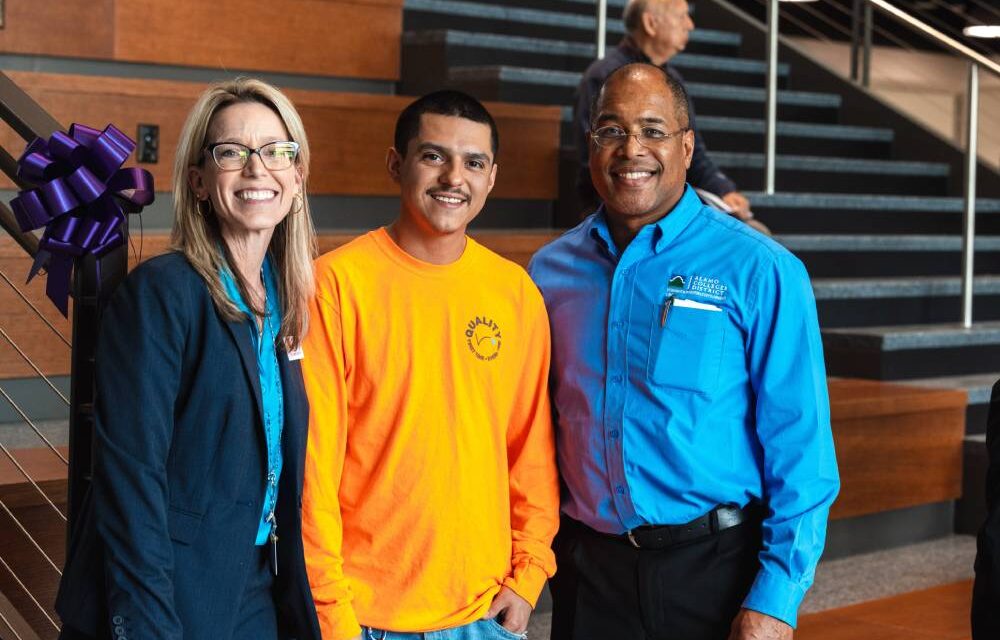The Alamo Colleges District Board of Trustees, Chancellor Dr. Mike Flores, and Northwest Vista College (NVC) will celebrate the ribbon cutting of the new Westside Education and Training Center, also known as WETC on Thursday, March 30 at 2 pm at 610 SW 41st St. The new building replaces the older building at the same site and will allow for greater community impact on the West Side of San Antonio.
The original WETC building opened in 2006 with an enrollment of 1,347 students – three times more than its target. In the last 17 years, West Side area residents have enrolled and turned into students, earning their high school diplomas, associate degrees, and certificates and transferring to universities. Northwest Vista College, the second largest in the Alamo Colleges District, offers academic courses and its Community Health Worker program at the WETC location.
”The new WETC is the realization of many years of planning and investment,” said Alamo Colleges Chancellor Dr. Mike Flores. “The Alamo Colleges is proud to open the new WETC that will continue to be a beacon of opportunity for many of the residents on the Westside wanting a better life for themselves and their families.”
In May 2017, Bexar County voters approved a $450 million capital improvement bond for the Alamo Colleges, with $23 million allocated for the WETC.
Constructed by Joeris General Contractors, the 46,907 square-foot building doubles the size of the previous building, which was the former Lincoln Elementary. The architect, HKS, designed state-of-the-art classrooms and labs and created computer and study spaces for students. The multi-use building will also feature a Veterans Outreach office.
WETC will also serve as the lead site for the Alamo Colleges District Ready to Work team, where intake, advising, case management and Career Services will take place.
Alamo Colleges District’s Education and Training Centers (ETC) are one-stop centers that meet community workforce training needs. The ETCs have expanded college, technical and academic options for students across the eight counties the Alamo Colleges District serves.
Since 2018, the centers – with the help of countless community partners – have provided assistance to 35,000 students and community members, including training in high-wage, high-demand industries, adult literacy education, GED preparation and testing, and skills for small businesses.
They also serve as on-ramps to Northwest Vista College, San Antonio College, St. Philip’s College, Palo Alto College, and Northeast Lakeview College. Currently, there are seven ETCs and two are under construction.
WETC and Lincoln Elementary Share a Common Mission
In 1959, the older WETC building (at the same location) was home to Lincoln Elementary, where both Black and Hispanic children went to school. Just five years before the school opened, San Antonio was one of the first major cities in 1954 to desegregate its schools following the U.S. Supreme Court decision in Brown v. Board of Education. Many African Americans moved near and around WETC since Kelly Air Force Base/Duncan Army Airfield offered the opportunity of employment as mechanics and as part of the aircraft maintenance crews.
At Lincoln Elementary, Elizabeth T. Wrenn became the school’s first principal. Before that, she was a teacher at the George Washington Carver School for African American children. Wrenn was also Edgewood’s first Black teacher. In 1968, the Edgewood Independent School District named their junior high after her, which is still open today.
The new WETC building will continue Wrenn’s legacy of educating students from diverse backgrounds. WETC Advisory Board Member and social justice advocate Manuel Garza says students who attended WETC affectionately turn the WETC acronym into ‘We Empower The Community.’
Interim NVC President Debi Gaitan said Alamo Colleges Education and Training Centers are changing lives, such as that of Armida Flores, who came to WETC in 2007.
Flores came to the center to improve her English-language skills and later earned a certificate in NVC’s Community Health Worker program. Now, she has a bachelor’s degree, serves as a mentor to many students, and is a bridge between the Latino community and healthcare workers.
“Armida’s (Flores) journey is an inspiration for all non-traditional adult students who succeed in their pursuit of education by gaining access to college in their own neighborhoods provided by the Alamo Colleges Westside Education and Training Center,” Gaitan said.









